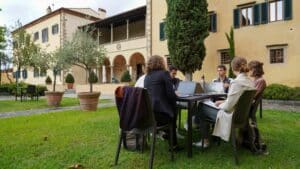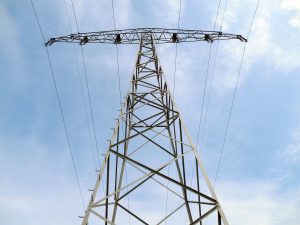FSR develops training courses fitting the specific needs of companies and public institutions. Supported by a global faculty of experts, we deliver tailor-made training courses in-house, on-site and online upon request.
Date: 25-29 September 2024
Organisation: Oman Energy Association (OPAL)
Place: Muscat (Oman)
Topic: Hydrogen and Carbon Capture Utilisation/Storage (CCUS) in the Energy Transition
Description: The training was designed to equip OPAL’s staff with an in-depth understanding of the nascent hydrogen sector and its regulation, of Carbon Capture and Utilisation/Storage (CCUS) technologies and of the global pursuit of investment finance for fostering a low-carbon economy, underscoring their pivotal role in the contemporary global energy paradigm.
The programme covered in three days:
Date: 22 July – 1 August 2024
Organisation: Kyiv School of Energy Policy (KSEP)
Place: Online
Topic: Smart Cities: Fuelling Tomorrows’ Local Energy & Climate Leaders
Description: The training programme was developed to deepen participants’ understanding of the components of the Green Deal relevant to urban decarbonisation transitions. Delivered through four teaching modules and three expert sessions online, the programme equipped participants with the knowledge needed to create or enhance Municipal Energy Plans (MEPs) for their communities, in line with EU energy and climate policy. The online modules focus on practical applications and challenges, allowing participants to anticipate and prepare for real-world implementation.
Some modules are divided into two parts, providing insights into multiple topics and perspectives from various experts.
This module introduced participants to the smart city governance process, emphasising best practices for planning and monitoring the transition to net-zero. The session included discussions on the Climate City Contract (CCC), investment needs, and stakeholder engagement, among other topics.
This module focused on smart metering and data management at the city level, exploring regulatory and infrastructural challenges and opportunities for distributed generation and renewable energy integration.
This module explores EU rules on permitting and zoning for renewable energy, highlighting opportunities for cities to foster renewable energy communities and decarbonise efficiently.
Participants learn about the EU’s Energy Performance of Buildings Directive (EPBD) and strategies for reforming district heating to improve energy efficiency in the built environment.
Date: 25 June 2024
Organisation: National Energy and Utilities Regulatory Commission (NEURC)
Place: Online
Topic: Regulation on Wholesale Energy Markets Integrity and Transparency – REMIT
Description: The training covered the most relevant concepts of the Regulation on Wholesale Energy Markets Integrity and Transparency – REMIT (e.g., insider trading and market manipulation), key obligations and prohibitions imposed on market participants and other stakeholders in the sector (e.g., obligations to disclose insider information), as well as ACER surveillance under REMIT and REMIT enforcement.
The training was divided into four sessions:
Obligation to establish and maintain effective arrangements and procedures to identify breaches of market abuse prohibitions and guarantee independence
1st edition (10–14 January 2022)
Place: Online
Topic: Decarbonisation, Gases, and LNG for Energy Experts from East Asia
Focus: Decarbonisation challenges and opportunities within the natural gas sector in East Asia, including solutions across the gas value chain and policy comparisons.
2nd edition (7–11 March 2022)
Place: Online
Topic: Gas Market Design, Structure, and Regulation
Focus: Overview of gas market organisation, EU market regulation, trading mechanisms, and security of supply, with case studies on Egypt and Israel.
3rd edition (13–17 June 2022)
Place: Online
Topic: LNG Market Structure, Organisation, and Arrangements
Focus: In-depth exploration of LNG markets, including pricing, trading, regulatory frameworks, and case studies on Japan, India, and US exports.
4th edition (7–9 February 2023)
Place: Bali, Indonesia
Topic: LNG Market Structure, Organisation, and Arrangements (in cooperation with ASCOPE)
Focus: LNG markets and strategies within the ASEAN region, with insights on supply-demand trends, corporate strategies, and case studies from Southeast Asia.
5th edition (6–8 December 2022)
Place: Cairo, Egypt
Topic: LNG Market Structure, Organisation, and Arrangements (Western Africa, Mediterranean, and Eastern Partnership)
Focus: LNG supply, pricing, and trading practices, including international cooperation and challenges in decarbonisation.
6th edition (23–25 May 2023)
Place: Cape Town, South Africa
Topic: Gas Market Design, Structure, and Regulation (in cooperation with SASOL)
Focus: EU market design, LNG pricing, energy integration, and regulatory issues with a focus on South African challenges.
7th edition (12–14 December 2023)
Place: Ho Chi Min, Vietnam
Topic: Gas Market Design, Structure, and Regulation (in cooperation with ASCOPE)
Focus: Gas market development in ASEAN, EU regulations, LNG trading, and case studies on Vietnam’s gas market.
8th edition (16–19 April 2024)
Place: Dakar, Senegal
Topic: Decarbonisation, Gases, and LNG (in cooperation with COS PETROGAZ, Senegal)
Focus: LNG and decarbonisation strategies, with regional initiatives on gas sector decarbonisation, including Senegal and Nigeria.
9th edition (17–19 October 2023)
Place: New Delhi, India
Topic: Decarbonisation, Gases, and LNG (in cooperation with FSR-Global)
Focus: LNG’s role in decarbonisation, methane emissions, and regulatory models, with case studies on integrating clean technologies in energy.
10th edition (11–14 June 2024)
Place: Buenos Aires, Argentina
Topic: LNG, Decarbonisation, and Gas Markets – Latin America & The Caribbean (in cooperation with CEARE, University of Buenos Aires)
Focus: LNG industry and decarbonisation in Latin America, with insights into Argentina and Brazil’s LNG sectors, hydrogen solutions, and a visit to the Escobar LNG Terminal.
Date: 23-24 January 2024 (Residential); 30 April and 3 May 2024 (Online)
Organisation: Department of the Environment, Climate and Communications (DECC)
Place: Dublin (Ireland) and Online
Topic: Gas and Electricity Market Design and Rules
Description: The training programme was developed to meet DECC’s needs for expertise in gas and electricity market design and rules. Delivered as a two-day residential course with two follow-up online sessions, it covered the fundamentals of markets functioning, regulatory frameworks, and key challenges in the gas and electricity sectors.
The residential part of the training was divided into three modules:
The two follow-up online sessions covered the following topics:
Date: 9 January 2024
Organisation: European Climate, Infrastructure and Environment Executive Agency (CINEA)
Place: Online
Topic: Hydrogen Regulation
Description: The training provided a fundamental understanding of the clean hydrogen sector, with a focus on regulatory frameworks and market uptake. Primarily centered on the European Union, the training also referenced key strategic and regulatory developments in third countries and discussed technological trends.
This training was run at an intermediate level. Participants had access to preliminary material on a dedicated platform and received two bespoke lectures from FSR experts to gain an understanding of the topics covered, with the opportunity to ask questions to explore some aspects of their specific interest.
Lecture 1: Introduction to Hydrogen and Hydrogen Infrastructure Regulation
Lecture 2: National Hydrogen Strategies, Electrolysers, and Infrastructure Planning
Date: 10-26 October 2023
Organisation: TAQA
Place: Online
Topic: Electricity Sector in Europe
Description: The training provided a comprehensive understanding of the electricity sector in Europe, with a focus on market functioning, regulatory issues, and electricity sector liberalisation, particularly in the context of the energy transition towards decarbonisation. The training was delivered in three modules, each consisting of a 3-hour live class.
Module 1: Electricity Sector Liberalisation and Wholesale Market Models
Module 2: Network Regulation and Retail Competition – Supply Liberalisation and Retail Competition
Module 3: The Current Challenges in the Energy Sector
Date: 12, 18 April 2023
Organisation: Joint Allocation Office
Place: Online
Topic: Flow-based capacity calculation and allocation
Description: The course was structured in two modules. The first module presented the intuition and the working of flow-based capacity calculation and allocation. In the second module the concepts presented in the first module were shown in their practical implementation, by going through a number of different scenarios using a simplified numerical model.
Module 1: the intuition and drivers of flow-based capacity calculation and allocation
Module 2: Numerical examples of the implementation of flow-based capacity calculation and allocation
Date: 30 January 2023
Organisation: umlaut
Place: Online
Topic:Market Coupling
Description: The course was delivered in one module, involving a 3-hour live class with time for discussion and
Q&A.
The module covered:
At the end of the course, participants were able to understand the way in which market coupling works in the day-ahead and intra-day
timeframes of the EU Internal Electricity Market; appreciate the difference between the Net Transfer Capacity (NTC) and the Flow-based
approach in capacity calculation, as applied in the EU Internal Electricity Market.
Date: 21 November 2022
Organisation: Coreso
Place: Brussels
Topic: Electricity sector liberalisation and trading
Description: This tailor-made course was designed to respond to the request of Coreso for training in the areas of electricity sector liberalisation and trading.
During this one-day training, participants had the opportunity to familiarise themselves with the fundamentals of EU electricity market liberalisation and energy trading in the internal electricity market.
Date: 8-10 November 2022
Organisation:Climate Action Network
Place: Online
Topic: Fundamentals and future prospects of electricity trading in the EU
Description: This tailor-made course was designed to respond to the request of Climate Action Network (CAN) for a training on them fundamentals of electricity trading in the EU with a specific focus on the the current market design challenges linked to the increasing penetration of renewables in the electricity mix. Its aim was to complement the CAN Europe’s team expertise in electricity markets. To meet the learning objectives, the course was divided in 3 modules and covered the background and fundamentals of electricity trading; the day-ahead and intraday trading and balancing in the EU Internal Electricity Market and the current debate on electricity market.
Date: 28 March – 7 November 2022
Organisation: Mediterranean Transmission System Operators
Place: Online
Topic: Benefit and measures for international power exchanges
Description: This tailor-made course was designed to respond to the request of the Mediterranean Transmission System Operators to train MED-TSO representatives on three aspects of electricity market integration (“what”, “why” and “how”), by describing:
Date: November-December 2021
Organisation: United Nations Economic and Social Commission for Asia and the Pacific
Place: Online
Topic: Regional power system integration trans- mission capacity calculation and pricing, smart grids and cybersecurity
Description: This tailor-made course was designed to respond to the request of the Economic and Social Commission for Asia and the Pacific to promote energy connectivity as an essential strategy to support the achievement of the SDG7 targets and to support efforts to decarbonise the region’s power grids. Its aim was to complement the ESCAP’s mandate to strengthen ASEAN’s efforts in developing a common understanding of the role of utilities and energy regulators in the context of power system connectivity, in line with UNESCAP’s Regional Road Map on Power System Connectivity. To meet the learning objectives, the course covered regional electricity market integration, cross-zonal capacity calculation and transmission charges and smart grids and related cybersecurity issues.
Date: 20 October 2021, 17 February 2022, 17 October 2022, 27 March 2023, 16 October 2023, March 2024, October 2024
Organisation: Baker Hughes
Place: Florence
Topic: EU Energy and environmental Policies and their impact on the industry
Description: This training explored the EU policy approach in addressing environmental concerns and climate change issues, which concretely translated into the publication of a number of energy and climate regulatory initiatives in recent years. In the first part of the session, participants had a chance to understand how the so-called EU Green Deal and the main climate policies could shape the future energy sector and what the implications for the industry would be. In the second part, we opened a window on a very topical debate at the moment in Europe: the recent shift from natural gas towards hydrogen and renewable or decarbonised gases and the possible impact of this policy shift on gas infrastructure. We concluded with a dedicated focus on methane emissions and role in international climate strategies, a topic which has been gaining importance in recent years and is now the focus of important global initiatives.
Date: June-July 2021
Organisation: EBRD
Place: Online
Topic: Renewable Energies
Description:
This tailor-made course has been designed to respond to the request of the European Bank for Reconstruction and Development (EBRD) for training in the renewable energy area, with a specific focus on the economic and regulatory aspects. Its aim was to complement the EBRD’s team expertise in contractual and project finance aspects.
To meet the learning objectives, the course was structured in three modules:
Date: April-May 2021
Organisation: UNESCAP
Place: Online
Topic: Regional electricity trading and market integration
Description:
The proposed training aimed at creating the capacity in the HAPUA and AERN members, as well as in other relevant actors in the ASEAN region, to take an informed decision on the most appropriate electricity trading and market integration model, also taking into account the need for consistency with the SDGs, including the targets for renewables deployment.
In this respect, the general objective of the proposed training was twofold:
More specifically, the course aimed at introducing participants to the key elements of regional power system integration and multilateral power trade, with a particular focus on the respective roles of utilities, regulators and policy makers, and ways they can help ensure that regional integration and multilateral power trade enable renewables integration and power sector decarbonisation throughout the ASEAN region.
To meet these objectives, the course has been structured in four modules and one roundtable, as follows:
All modules, will, to the extent relevant, discuss implications of regional power system integration for the sustainable development goals, including renewables integration and decarbonisation.
Date: January 2021
Organisation: Innovation and Networks Executive Agency | INEA
Place: Online
Topic: Renewable Energy Sources
Description: The FSR tailor-made training has been designed to meet INEA’s requirements, and was composed of two parts:
This course addressed the promotion of renewable energy sources and their integration in the energy sector with an emphasis on electricity. After an introduction to the main economic and technological aspects of RES and their status in the EU, the course provided a summary of the European policy on RES, from its emergence in the late 1990s to the recent discussion on the Green Deal. Building on this framework, significant attention has been devoted to the various instruments available to policymakers and which have been typically implemented to support RES uptake in the EU. For each of the main policy tools, a description was given, highlighting its main advantages and drawbacks. Auctions were discussed in detail to show how they can be used – and have been used – to promote competition and improve cost-effectiveness in the use of public resources. Concrete experience from two jurisdictions complemented the general description of this instrument, which has gained centre-stage in the past few years. The course considered also how the deployment of RES affects the functioning of the electricity market and system. Indeed, the rapid penetration of wind and solar PV poses challenges that must be understood if the ultimate goal of RES policies is to ensure a decarbonisation of the energy system that is least-cost and compatible with the internal market for energy.
Date: 8 – 30 June 2020
Organisation: World Bank
Place: Online
Topic: Renewable Energy
Description: This FSR tailor-made training on Renewable Energy was designed to meet the World Bank’s specific requirements. The training course was the first tailor-made training designed and delivered entirely online. It was composed of two modules:
Each module was composed of:
Date: 3 March 2020
Organisation: DG ENER
Place: Brussels, Belgium
Topic: Energy
Description: This course was specifically designed to meet DG ENER’s requirements to cover the fundamentals of unbundling in the energy sector, and market issues in the electricity and gas sector. Effective unbundling is a precondition for the development of fair competition in the energy sector. An appropriate market design promotes competition and therefore efficiency in the energy sector, ensuring fair prices and greater choice for EU consumers. Well-functioning markets make also easier to pursue the multiple objectives of EU energy policy (sustainability/decarbonisation, efficiency, security of supply, affordability) in a consistent way. In fact, if markets are well designed, it is easier to ensure the smooth functioning and interaction of parallel markets, than it is the case with administrative instruments. The course focused on specific aspects which have proved to be particularly complex or sensitive in their implementation.
Date: 4-5 October 2018
Organisation: Indian Ocean Commission
Place: Antananarivo, Madagascar
Topic: Electricity Regulation
Description: This one-and-a-half-day residential training session represented the second block of a tailor-made blended learning programme specifically designed by the Florence School of Regulation to meet the learning objectives of participants from Comoros and Madagascar.
Date: 20 March 2018
Organisation: VII World Forum on Energy Regulation 2018
Place: Cancun, Mexico
Topic: Electricity Regulation
Description: This course was specifically designed for the Regulatory Training Day at the World Energy Forum to cover the fundamentals of the electricity industry. Namely, the course reviewed the basics of economic regulation and regulatory institutions, the structures of the electricity industry focussing on competition and regulation, and the wholesale market design. It also provided an overview of the most important aspects of electrification and renewable energy markets.
Date: 11-19 December 2017
Organisation: Perusahaan Gas Negara
Place: Bandung, Indonesia
Topic: Gas Tariffs
Description: The main objective of the five-day training course is to transfer knowledge to participants through the presentation of the regulatory toolbox used internationally for Network Access Rules and practices.
Date: 4-8 December 2017
Organisation: Perusahaan Gas Negara
Place: Bandung, Indonesia
Topic: Gas Network Codes
Description: The main objective of the study is to transfer the knowledge to participants through the presentation of the regulatory toolbox used internationally for Accounting Unbundling and Tariff Setting. Besides the general regulatory framework, the participants will be introduced to simple worksheet tools that will enable them to calculate tariffs by means of different methodologies and to evaluate results of different solutions. The study will address Accounting Unbundling and Tariffs adopting a very practical orientation.
Date: 14-15 November 2017
Organisation: FSR, Technological University of Pereira (UTP) and University of Chile
Place: Bogotà, Colombia
Topic: Regulatory Challenges
Description: This joint training consisted of a tailor-made blended programme, specifically designed to meet the learning objectives of the participants from the Colombian Commission for the Regulation of Energy and Gas (CREG). The course explained the most critical challenges that distribution networks regulators are facing because of the high penetration of distributed energy resources. It covered a brief overview of their technical characteristics a review of international experiences, and an extensive dialogue with experts about the latest regulatory trends and practices.
Date: 31 October – 1 November 2017
Organisation: German Development Agency (GIZ)
Place: Rabat, Morocco
Topic: Energy Regulation and RES
Description: This two-day ad hoc training is supporting the German Development Agency (GIZ) in the creation of a Moroccan Regulatory Agency for electricity. The course will provide participants with a fundamental understanding of energy regulation and markets, as well as on the integration of renewables and distribution grids.
Date: 26-27 September 2016
Organisation: Ministry of Energy, Commerce, Industry and Tourism
Place: Nicosia, Cyprus
Topic: Electricity and Gas Markets
Description: The three days training were organised to reach the targets described in the tender specifications: to combine principles with realities and cases; to adapt EU legal and regulatory frames to the circumstances of insular systems; to open the analysis to the entry of gas and of renewables into the energy system; to identify ways of cooperation between the many parties involved.
Date: 4-9 December 2016 / 10-11 July 2017 / 25-27 September 2017
Organisation: Perusahaan Gas Negara (PGN) – Indonesia
Place: Bandung, Indonesia / Florence, Italy / Jakarta, Indonesia
Topic: Natural Gas Regulation
Description: The first part of the training course gave a comprehensive overview of different types of regulatory models and practices in the gas industry around the world and performed an in-depth review of the best practices in tariff design.
The second part of the training course consisted in a workshop developed by the Florence School of Regulation to assist Perusahaan Gas Negara in analyzing and proposing potential solutions for the current regulatory challenges that the Indonesian gas industry is facing.
The third part of the training course consisted of a workshop in Jakarta meant to present a preliminary report that resulted from the previous two parts of the training course and to discuss the last adjustments to the same.
The fourth and last part of the training course consisted in the delivery of an ample training report to PGN containing potential paths for regulatory improvement in Indonesia and recommendations.
Date: 6-8 February 2017 / 20-21 July 2017
Organisation: Ministries and Companies from five islands (Mauritius, Madagaskar, Comoros, La Reunion and Seychelles)
Place: Mauritius
Topic: Power, Renewables, Energy Efficiency
Description: The training cycle consisted of a tailor-made blended learning programme which was specifically designed to meet the learning objectives of the Indian Ocean participants. It consisted of three blocks and combined theory and practice throughout the programme. The first block consisted of a three day residential training which provided an introduction to power systems and grid regulation; renewables and how to introduce them into power systems; and how to optimise energy efficiency.
The second block consisted of an eight-week online training course focusing on the regulation of power systems and allowed participants to focus on the main challenges within their local settings.
After the completion of the online training, the third and final block of the programme consisted of a two-day residential training course which allowed participants to discuss any outstanding issues raised during the online course on energy regulation and energy policy in practice.
Date: 28 February 2017
Organisation: Renewables Grid Initiative
Place: Brussels
Topic: Power Markets
Description: The training, organised in cooperation with Renewables Grid Initiative (RGI), was tailored made for NGOs to provide insights into the current state of play of power markets, including the development, integration and challenges of wholesale and balancing markets.
Participants Enrolled
Courses Available
Countries
International Faculty
The FSR online courses adopt interactive tools and live activities to enhance the learning experience, supported by an innovative platform and a dedicated facilitation team.
ExploreOn the enchanting hills of Florence, our residential courses are taught by a faculty of academics and high-level professionals and they offer a unique opportunity for training and networking.
ExploreFSR develops training courses fitting the specific needs of companies and public institutions. Supported by a global faculty of experts, we deliver tailor-made training courses in-house, on-site and online upon request.
Explore
The role of space in tackling real-world challenges is still emerging, yet it holds the potential to transform every aspect of our daily lives, economies, and digital futures. To realise…

The Energy Law Research School seeks to offer emerging scholars (doctoral and postdoctoral researchers) in EU energy law the opportunity to gain an understanding of the most important issues in…

Crafting research with impact on energy policy and regulation LARS is a residential training addressing researchers with modeling skills who are keen to support the energy policy and regulatory debate.…

EU Electricity Network Codes & the Clean Energy Package Enter the world of electricity markets in Europe ‘Evolution of electricity markets in Europe’ is an 8-week online course in collaboration…

2025 marks the tenth anniversary of the Paris Agreement. The ‘Getting to Net Zero’ course at the Florence School of Regulation aims to provide an overview of the role of the…

This new training course on the Regulation and Integration of Renewable Energy provides a comprehensive introduction to the topic with the latest updates, including developments in policy and regulation in…

Originally designed for participants in the EUI Global Executive Master, this course is now open to all professionals seeking to deepen their understanding of energy markets and regulation. Three features…

Digitalisation is transforming transport and mobility. Understanding the regulatory implications of digitalisation requires knowledge of EU digital law and policy (DSA, DMA, Data Act) and the regulatory strategy in transport…

Regulation of energy utilities All you need to know in one professional course With the Annual Training on the Regulation of Energy Utilities, you will gain extensive knowledge of the fundamental principles of…
To meet, discuss and learn in the channel that suits you best.